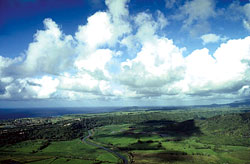 Climate change could tilt the world economy into the worst recession in recent history, warns a UK Treasury report.
Climate change could tilt the world economy into the worst recession in recent history, warns a UK Treasury report.
Nicholas Stern, a former World Bank chief economist, will warn that governments need to tackle the problem head-on by cutting emissions or face economic ruin.
The findings will turn the economic argument about global warming on its head by insisting that fighting global warming will save industrial nations money. The US refused to join the Kyoto protocol on greenhouse gas emissions because George Bush said it would harm the economy.
"All of Stern's detailed modelling out to the year 2100 is going to indicate first of all that if we don't take global action we are going to see a massive downturn in global economies," said David King, the UK government's chief scientific adviser.
"If no action is taken we will be faced with the kind of downturn that has not been seen since the great depression and the two world wars." He also called the review the most detailed economic analysis yet.
"This is not just an environmental problem," said British foreign secretary Margaret Beckett. "It is a defence problem. It is a problem for those who deal with economics and development, conflict prevention, agriculture, finance, housing, transport, innovation, trade and health."
Stern argues that tackling the problem may not prove as economically painful as some experts predict. The International Energy Agency predicts that $15 trillion of investment in new energy sources will be required over the next 15 years. "The massive investment program that's ahead of us is an opportunity to move towards a zero carbon energy system. The investment process is going to act quite possibly in the opposite direction to an economic downturn," King said.
He drew parallels between scientific advice on global warming and advice from seismologists ahead of the 2004 tsunami. A month before the disaster a delegation warned governments around the Indian Ocean about the extreme danger posed by tectonic activity under the sea. No government chose to act on the advice. "$30 million as the cost to install some kind of early warning system presumably looked like a lot of money." But such a system could have saved 150,000 lives.
(The Guardian)


